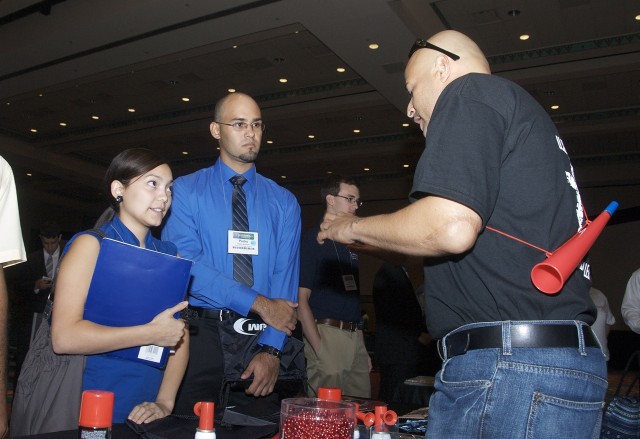
ORLANDO, Fla. -- More than 3,000 high school and college students are attending a three-day conference focused on building interest in Science, Technology, Engineering and Mathematics, known as STEM, at the 2010 Hispanic Engineer National Achievement Awards Conference here.
The event kicked off Oct. 7 sponsored by Great Minds in STEM, a California-based nonprofit organization dedicated to advancing STEM education.
"With Viva Technology, our job is to expose kids to these options," explained Adalina Rodriguez, Viva Technology program manager. "In the activities, we have them work in teams, we have them try new things and encourage them to be creative problem solvers."
Rodriguez said it is important to expose the students to positive role models.
"Not only can they see that they can do it and it's fun, but also there are people just like them, be it in terms of ethnicity or background, who have done things like this, and it's feasible."
Students find value in the opportunity to network with each other, as well as corporate and government representatives.
"When I get out of school I want to do research in a Ph.D program," said Juan Escobar, a student with California State University at Los Angeles. "Learning about companies who pay for a Ph.D program is very beneficial to me. Many of these corporations will sponsor you to go to school, and a lot of people don't know that."
The Department of Defense offers many opportunities through its SMART scholarship program (Science, Mathematics & Research for Transformation). The SMART program is designed to support undergraduate and graduate students pursuing degrees in STEM disciplines. Officials said the program "aims to increase the number of civilian scientists and engineers working at DoD laboratories."
The United States Army and other services play a big role sponsoring conferences like this. The Research, Development and Engineering Command, the organization responsible for engineering the Army of the future, is always looking to spark interest in technology and service to the nation.
"When you start selecting your career, you need to select something that is challenging, rewarding and exciting," Command Sgt. Maj. Hector Marin told a group of students during the keynote presentation.
Marin, a native of Honduras, joined the Army in 1981 and is now the senior noncommissioned officer for the Research, Development and Engineering Command and Aberdeen Proving Ground in Maryland. Marin shared his personal story with the students.
"HENAAC is a unique conference in the sense that it give students the opportunity to network one-on-one with professionals, and also through the college bowl experience, future employers have the opportunity to see the caliber of your personality, skills and teamwork," said Paul Christopher James, a student with Texas A&M;at Kingsville.
During the conference, the Army is taking resumes and even making conditional job offers to qualified college graduates with the right credentials. The Army has sponsored this conference for 12 years with the goal of mentoring young students toward science and technology careers and finding motivated minds to bring solutions to tomorrow's battlefield.
Related Links:
More Army science and technology news

Social Sharing